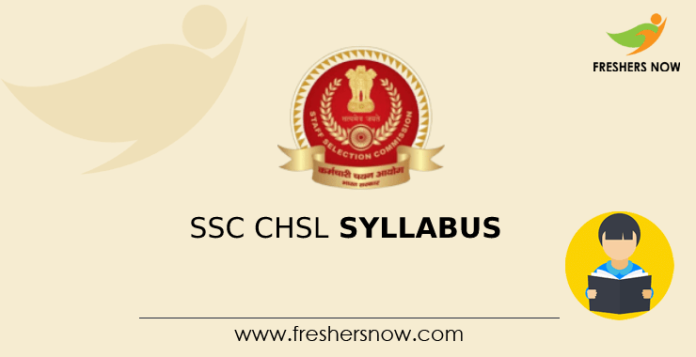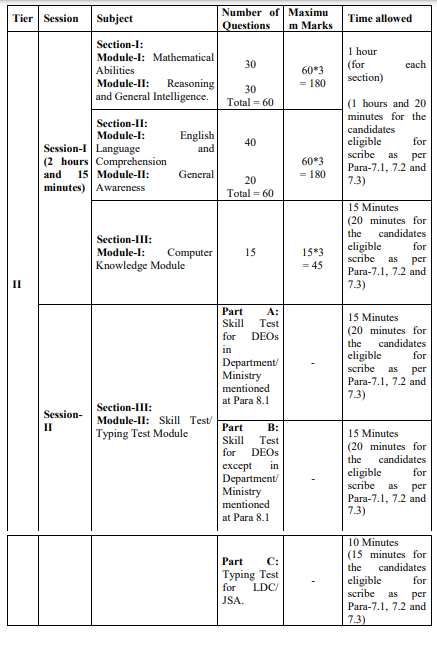
SSC CHSL Syllabus 2025 & Exam Pattern PDF Download (Revised Tier 1, 2 Syllabus): SSC CHSL is one of the crucial exams that will be conducted every year to recruit aspirants for the Lower Divisional Clerk (LDC)/ Junior Secretariat Assistant (JSA) Data Entry Operator (DEO) and Data Entry Operator Grade A Posts. As a part of the preparation for the SSC CHSL Exam, we have provided you with a detailed explanation of the SSC CHSL Revised Syllabus 2025In English and the SSC CHSL Exam Pattern.
SSC CHSL Syllabus 2025
SSC CHSL Exam will be having Tier 1, and Tier 2 Exams. THE SSC CHSL Tier 1 Exam will have 100 Questions & 200 Marks and the questions will be asked about General Intelligence, General Awareness, Quantitative Aptitude, and English Language Topics. To check SSC CHSL Tier 2 Exam Pattern details refer below sections.
SSC CHSL Syllabus 2025 – Overview
| Latest SSC CHSL Syllabus 2025 | |
| Organization Name | Staff Selection Commission (SSC) |
| Post Names | Lower Divisional Clerk (LDC)/ Junior Secretariat Assistant (JSA) Data Entry Operator (DEO) and Data Entry Operator Grade A |
| Name of the Exam | Combined Higher Secondary Level (CHSL, 10+2) Exam |
| Category | Syllabus |
| Selection Process | Computer-Based Examination – Tier I, Tier II |
| Job Location | Across India |
| Official Site | ssc.nic.in |
SSC CHSL Exam Pattern 2025 (Tier 1, 2)
SSC CHSL Tier 1 Exam Pattern
The SSC CHSL Tier 1 Examination will only consist of Objective Type, Multiple-choice questions. The questions will be set in English and Hindi for Parts II, III & IV. There will be a negative mark of 0.50 for each wrong answer. Candidates are, therefore, advised to keep this in mind while answering the questions.
| Part | Subject | No of Questions | Max Marks | Exam Duration |
| I | English Language (Basic Knowledge) | 25 | 50 | 60 minutes (80 Minutes for PWD candidates) |
| II | General Intelligence | 25 | 50 | |
| III | Quantitative Aptitude (Basic Arithmetic Skill) | 25 | 50 | |
| IV | General Awareness | 25 | 50 | |
| Total | 100 | 200 | – | |
SSC CHSL Tier 2 Exam Pattern
Tier II will consist of objective-type multiple-choice questions, except for Module II of Section III. The questions will be set in English, Hindi, and any language the candidate chooses in the application form except for Module II (i.e. English Language and Comprehension module) in Section II. There will be a negative marking of 1 mark for each wrong answer in Section I, Section II, and Module-I of Section III. Candidates are, therefore, advised to keep this in mind while answering the questions.

Note:
- Tier II will be conducted in two sessions – Session –I & Session II, on the same day. Session I will include conducting Section I, Section II, and Module I of Section III. Session II will include conducting Module II of Section III.
- It will be mandatory for the candidates to qualify for all the sections of Tier II.
- Module-I of Section-III i.e. Computer Knowledge Test is mandatory but qualifying in nature.
SSC CHSL Syllabus 2025 (Tier 1, 2)
Indicative Syllabus (Tier-I):
- English Language: Spot the Error, Fill in the Blanks, Synonyms/ Homonyms, Antonyms, Spellings/ Detecting misspelled words, Idioms & Phrases, word substitution, Improvement of Sentences, Active/ Passive Voice of Verbs, Conversion into Direct/ Indirect narration, Shuffling of Sentence parts, Shuffling of Sentences in a passage, Cloze Passage, Comprehension Passage.
- General Intelligence: It would include questions of both verbal and non-verbal types. The test will include questions on Semantic Analogy, Symbolic operations, Symbolic/ Number Analogy, Trends, Figural Analogy, Space Orientation, Semantic Classification, Venn Diagrams, Symbolic/ Number Classification, Drawing inferences, Figural Classification, Punched hole/ pattern-folding & unfolding, Semantic Series, Figural Pattern-folding and completion, Number Series, Embedded figures, Figural Series, Critical Thinking, Problem Solving, Emotional Intelligence, Word Building, Social
Intelligence, Coding and de-coding, Numerical Operations, and Other sub-topics, if any. - Quantitative Aptitude:
- Number Systems: Computation of Whole Numbers, Decimals and Fractions, and Relationship between numbers.
- Fundamental arithmetical operations: Percentages, Ratio and Proportion, Square roots, Averages, Interest (Simple and Compound), Profit and Loss, Discount, Partnership Business, Mixture and Allegation, Time and distance, Time and Work.
- Algebra: Basic algebraic identities of School Algebra and Elementary surds (simple problems) and Graphs of Linear Equations.
- Geometry: Familiarity with elementary geometric figures and facts: Triangle and its various kinds of centers, Congruence and similarity of triangles, Circle and its chords, tangents, angles subtended by chords of a circle, common tangents to two or more circles.
- Mensuration: Triangle, Quadrilaterals, Regular Polygons, Circle, Right Prism, Right Circular Cone, Right Circular Cylinder, Sphere, Hemispheres, Rectangular Parallelepiped, Regular Right Pyramid with triangular or square Base.
- Trigonometry: Trigonometry, Trigonometric ratios, Complementary angles, Height and distances (simple problems only) Standard Identities like sin2? + Cos2?=1, etc.,
- Statistical Charts: Use of Tables and Graphs: Histogram, Frequency polygon, Bar-diagram, Pie-chart.
- General Awareness: Questions are designed to test the candidate’s general awareness of the environment around him and its application to society. Questions are also designed to test knowledge of current events and such matters of everyday observation and experience in their scientific aspect as may be expected of an educated person. The test will also include questions relating to India and its neighboring countries, especially about History, Culture, Geography, Economic Scene, General policy, and scientific research.
Indicative Syllabus (Tier-II)
Module-I of Session-I (Mathematical Abilities):
- Number Systems: Computation of Whole Numbers, Decimal and Fractions, and Relationship between Numbers.
- Fundamental arithmetical operations: Percentages, Ratio and Proportion, Square roots, Averages, Interest (Simple and Compound), Profit and Loss, Discount, Partnership Business, Mixture and Alligation, Time and distance, Time and Work.
- Algebra – Basic algebraic identities of School Algebra and Elementary surds (simple problems) and Graphs of Linear Equations.
- Geometry: Familiarity with elementary geometric figures and facts: Triangle and its various kinds of centers, Congruence and similarity of triangles, Circle and its chords, tangents, angles subtended by chords of a circle, common tangents to two or more circles.
- Mensuration: Triangle, Quadrilaterals, Regular Polygons, Circle, Right Prism, Right Circular Cone, Right Circular Cylinder, Sphere, Hemispheres, Rectangular Parallelepiped, Regular Right Pyramid with triangular or square Base.
- Trigonometry: Trigonometry, Trigonometric ratios, Complementary angles, Height and distances (simple problems only) Standard Identities like sin2? + Cos2?=1, etc.
- Statistics and probability: Use of Tables and Graphs: Histogram, Frequency polygon, Bar-diagram, Pie-chart; Measures of central tendency: mean, median, mode, standard deviation; calculation of simple probabilities.
Module II of Section-I (Reasoning and General Intelligence):
Questions of both verbal and non-verbal type. These will include questions on Semantic Analogy, Symbolic operations, Symbolic/ Number Analogy, Trends, Figural Analogy, Space Orientation, Semantic Classification, Venn Diagrams, Symbolic/ Number Classification,
Drawing inferences, Figural Classification, Punched hole/ pattern-folding & unfolding, Semantic Series, Figural Pattern-folding and completion, Number Series, Embedded figures, Figural Series, Critical Thinking, Problem Solving, Emotional Intelligence, Word Building, Social Intelligence, Coding and de-coding, Numerical operations, Other subtopics, if any.
Module-I of Section-II (English Language And Comprehension):
Vocabulary, grammar, sentence structure, synonyms, antonyms and their correct usage; Spot the Error, Fill in the Blanks, Synonyms/ Homonyms, Antonyms, Spellings/ Detecting misspelled words, Idioms & Phrases, word substitution, Improvement of Sentences, Active/ Passive Voice of Verbs, Conversion into Direct/ Indirect narration, Shuffling of Sentence parts, Shuffling of Sentences in a passage, Cloze Passage, Comprehension Passage. To test comprehension, two or more paragraphs will be given and questions based on those will be asked. At least one paragraph should be a simple one based on a book or a story and the other paragraph should be based on current affairs editorial or a report.
Module-II of Section-II (General Awareness):
Questions are designed to test the candidates’ general awareness of the environment around them and its application to society. Questions are also designed to test knowledge of current events and such matters of everyday observation and experience in their scientific aspect as may be expected of an educated person. The test will also include questions relating to India and its neighboring countries, especially about History, Culture, Geography, Economic Scene, General policy, and scientific research.
Module-I of Section-III of Paper-I (Computer Proficiency):
- Computer Basics: Organization of a computer, Central Processing Unit (CPU), input/ output devices, computer memory, memory organization, backup devices, PORTs, Windows Explorer, and Keyboard shortcuts.
- Software: Windows Operating system including basics of Microsoft Office like MS Word, MS Excel PowerPoint, etc.
- Working with the Internet and e-mails: Web Browsing & Searching, Downloading & Uploading, Managing an E-mail Account, e-banking.
- Basics of networking and cyber security: Networking devices and protocols, Network and information security threats (like hacking, viruses, worms, Trojans, etc.), and preventive measures.
Module II of Section III i.e. Skill Test/ Typing Test
- Module II of Section III will include conducting of Skill Test/ Typing
- Test in Session II on the same day.
- Skill Test/ Typing Test will be qualifying.
- Skill Test/ Typing Test will be evaluated as per the evaluation guidelines available on the website of the Commission.
- Errors in the Skill Test will be calculated up to 2 decimal places.
- Skill Test/ Typing Test will be conducted as per the following scheme:
Skill Test for Data Entry Operator:
Skill Test is mandatory for Data Entry Operators. No candidate is exempted from appearing in the Skill Test.
- Part A – Skill Test for the post of DEO/ DEO Grade ‘A’ in Department/ Ministry mentioned in Para 8.1: The ‘speed of 15000 (Fifteen Thousand) Key Depressions per hour on Computer’ will be adjudged based on the correct entry of words/ key depressions as per the given passage. The duration of the Test will be 15 (Fifteen) minutes and printed matter in English containing about 3700-4000 key depressions will be given to each candidate who would enter the same in the Computer. The passage to be entered into the computer may also be displayed on the computer screen.
- Part B – Skill Test for the post of DEO/ DEO Grade ‘A’ except in Department/ Ministry mentioned in Para 8.1: ‘Data Entry Speed of 8,000 (Eight Thousand) Key Depressions per hour on Computer’ will be adjudged based on the correct entry of words/ key depressions as per the given passage. The duration of the Test will be 15 (Fifteen) minutes and printed matter in English containing about 2000-2200 key depressions will be given to each candidate who would enter the same in the Computer. The passage to be entered into the Computer may also be displayed on the computer screen.
- Part C – Typing Test for other posts i.e. LDC/ JSA – The medium of the Typing Test will be Hindi or English. The candidates will have to opt for the medium of Typing Test i.e. either Hindi or English in the online Application Form. The choice of Typing Test during the application form will be final. There will be no change in the medium of the Typing Test. Candidates opting for English medium should have a typing speed of 35 words per minute (w.p.m.) The candidates opting for Hindi medium should have a typing speed of 30 words per minute (w.p.m.) The speed will be adjudged on the accuracy of typing on the Computer of a given text passage in 10 minutes.
SSC CHSL Syllabus 2025 Download Link
| SSC CHSL Syllabus 2025 PDF Download Link | |
| To Download the SSC CHSL Syllabus 2025 | Download Syllabus |
Stay in touch with our website Freshersnow.Com for more updates about SSC CHSL Syllabus 2025.
★★ You Can Also Check ★★



